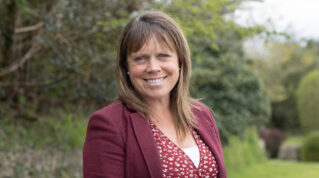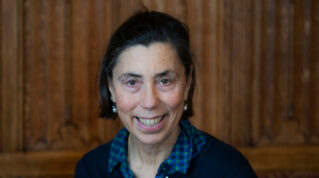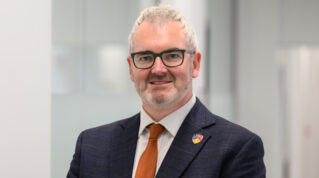It’s unlikely that many teachers expect to oversee more than 20,000 people and hundreds of thousands of exam results – but Sharon Hague does just that.
The former geography teacher, now senior vice-president of schools at Pearson, spent eight years in classrooms in Hertfordshire and Essex before trying her hand as an examiner to help her pupils perform better. There, she says, she caught the assessment bug.
“The more I got involved with exams, the more fascinating I found it. When you’re in the classroom it’s hard to imagine how much work goes into creating the exam paper. So when I saw a job come up at Edexcel for a one-year contract, I thought I’d take it.”
Almost 20 years later and Hague is top of the UK arm of Pearson, the publishing parent company for Edexcel.
She is responsible for “all our services for schools in the UK” – enough to make even a hardened academy trust boss gulp. This involves a permanent team of about 1,000 staff based in London, Oxford, Yorkshire and Manchester, and an additional 1,500 temporary employees and 16,000 to 20,000 examiners over the summer.
Her eyes are not just on the UK either. As a senior manager for the world’s biggest education company, which had an operating profit of £546 million last year, she must consider how global technological advances might benefit UK schools. The responsibility is huge.
This summer has been particularly testing.
From an impressive classical building on The Strand in the heart of London, she calmly answers questions about this year’s problems. She is flanked by two communications officers, however, so it’s hard to get her off-message.
When I ask about the discovery in June that sections of the Edexcel A-level maths exam were leaked on social media, she quickly says it proved the efficiency of Pearson’s detection systems.
We isolated the source of the leak within hours
“We know which exam papers have been sent to particular schools, so we can track receipt of those in a sophisticated way. We were able to isolate the source of the leak within hours.”
But how did she deal with this – was it stressful? And are teachers letting down their profession by compromising papers like this? She dodges the invitation to blame.
“It was a very difficult situation, a complex situation to manage. But I like to think we did everything we could to support parents and students.”
The speed of the security response from Pearson also points to technological developments. In a trial with a handful of schools this summer, the company attached microchips to exam paper packets. These were then scanned by schools, enabling Pearson to track where papers were received and when. The trial will be expanded next summer.
But things got hotter in August when the company made the highly controversial decision, on Hague’s watch, to send a letter to pupils on a Friday afternoon, just a few days before they collected their results, to tell them exam boundaries for BTEC awards had been hiked.
The last-minute decision meant some pupils faced lower grades and more than 12,000 people signed a petition calling for the decision to be reversed.
I ask Hague how Pearson got its grade modelling so wrong. With just a flicker of testiness, she says: “This is the first time the BTECs were being assessed, so until all the teacher assessments were submitted by the schools, it wasn’t really until the summer that we saw an emerging picture of how schools were performing.”
But informing schools at 5pm on a Friday? Really? Hague concedes that “ . . . if we needed to make that decision again, we would be able to communicate it in a more timely way”.
Pearson’s course specification document was edited following the gaffe. Schools Week revealed the disappearance of a reference that schools must be “informed before the start of teaching” of grade changes. I press Hague on this, but, again, she doesn’t give an inch: “We updated the specification document.”
We feel a responsibility as an exam board
Pearson did move quickly. Revised grades were issued to pupils so they weren’t disadvantaged. I ask, twice, how many pupils got new grades, but an aide jumps in with “a small number”.
I then ask how, in September, Pearson sent incomplete BTEC results to the government, which could have affected school progress scores. “It was a purely administrative error,” Hague says. Has this lead to company action? Again, a communications aide leaps in. “It was an administrative error.”
Yet for such a turbulent time, Hague comes across as an unflustered and capable pair of hands.
So what if she were education secretary? “I’d make assessments more valid, more reliable, and make them work more effectively for students.”
A somewhat unimaginative, but fair response. In fact, one could say Hague’s public persona is not entirely unlike a good assessment.
An east London girl, she grew up with a younger brother, stay-at-home mum and telephone engineer dad, and was the first to in her family to go to university (Oxford). She becomes enthusiastic about a “student engagement” pilot Pearson is launching to get pupil feedback on A-level maths.
“The approach we’ve always taken is that students will be best supported by the teachers that know them, but we feel a responsibility as an exam board,” she says.
The pilot, which is recruiting pupils now, will expand into other A-level subjects. “What are the points at which students need information, what are the channels, what should the information look like?” Pupils will be quizzed on everything from revision techniques to exam stress.
With a daughter in year 7 and a son studying GCSEs, wellbeing is on Hague’s mind. Her team has developed a toolkit with the Anna Freud National Centre for Children and Families this term to “measure the wellbeing of teachers and students so schools can identify areas they could work on”. Teacher workload is also in Hague’s sights, with Pearson developing an online A-level Spanish course that uses onscreen assessments that can help to reduce manual data entry. There are “opportunities” in this area, she hints. But she sticks to the party line that digital-only textbooks in the US are not on the cards for the UK. Yet.
A model for inclusion – Hague is among the 31 per cent of female senior managers at Pearson from a 62 per cent female workforce – she’s also pushed for greater diversity. The company became the first exam board to allow pupils to opt out of gender classifications this summer, winning praise from LGBT charity Stonewall.
Meanwhile Edexcel’s GCSE English literature has introduced more diverse texts, including Refugee Boy by Benjamin Zephaniah this September.
Hague pauses, happy at these achievements, and uses a rare “I” instead of the company “we”.
“One of the great things about the role I have now is really trying to understand the challenges facing schools and teachers, and how to support them.”
Two decades on, and the former teacher still sounds most excited when she talks about the many thousands of schools she and her team aim to help.














Sharon Hague has been one of the biggest failures in Pearson. She has blurted out DFE approval for PowerMaths when it was condiential.
Failed to see the trends in the schools market, lost a fortune in the Schools UK business, precided over major failures in Edexcel, shows total contempt for students and Teachers, has attmepted to sell her son as a mother to pass the buck on exam leaks.
A highly toxic failure, who has laughed at people behind thier backs knowing they were being made redundant or pushed out of the business. The only reason shes in the job is the ability to keep Rod Bristow’s and John Fallon’s skeltons hidden.
Pearson’s reputation for work place, bullying, harssament and failure grew under Sharon Hague who looks after number one and keeps favourites over ability and talent. She does not care about Teachers, students or Parents so long as her job is safe
This ariticle and her continued employment in Pearson the textbook seller is a disgrace